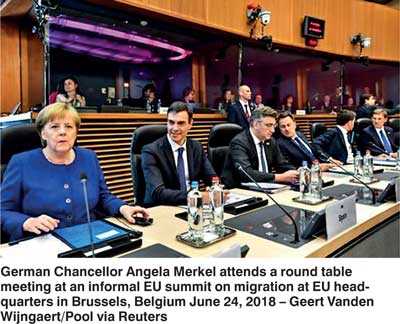Sunday Feb 15, 2026
Sunday Feb 15, 2026
Tuesday, 26 June 2018 00:40 - - {{hitsCtrl.values.hits}}
BRUSSELS (Reuters): German Chancellor Angela Merkel said on Sunday she would seek direct deals with separate European Union states on migration, conceding that the bloc was unable to quickly find a joint solution to an issue that is threatening her government.

Since Mediterranean arrivals spiked in 2015, when more than a million refugees and migrants reached the bloc, EU leaders have been at odds over how to handle them, the feud weakening their unity and undermining Europe’s free travel area.
Sixteen of the EU’s 28 leaders held talks in Brussels on Sunday, ahead of a summit, the European Council, on June 28-29.
“We know that at the European Council, unfortunately, we will not have a complete solution of the migration issue,” Merkel said on arriving at the meeting.
Merkel is under pressure to find a solution by the summit, because her coalition partner is pushing for a sharper course in migration policy that could ultimately lead to a collapse of her government. Unable to wait for full EU consensus, Merkel said she would go for faster measures.
“That is why there will be bilateral and trilateral agreements, how can we help each other - not always wait for all 28 members but think about what is important to whom,” she said.
French President Emmanuel Macron seemed to offer Merkel his cautious backing, saying while the solution to migration should be “European”, it could be built through the cooperation of all EU members or just several deciding to go together.
U.N. data shows only some 41,000 people have made it to the EU across the sea this year but opinion polls show migration is the top concern for the EU’s 500 million citizens.
Italy has long struggled to cope with arrivals and its new populist government rejects any ideas that would see it handle even more people.
Prime Minister Giuseppe Conte said EU rules that the first EU country of arrival is responsible for migrants should be dropped. This would greatly reduce the pressure on Italy.
He also called for other EU countries to accept their share of economic migrants entering the bloc, or get less EU money, reviving an idea that has already been rejected by mostly central European countries in the past.Since 2015, the EU has become more restrictive on asylum and tightened its external borders to let fewer people in.
At loggerheads over hosting asylum seekers, EU states agree they want to work more with other regions such as north Africa to prevent people from setting sail for Europe.
They are considering setting up centres abroad to decide on asylum requests there and send back those whose cases fail.
“A European solution means throwing more German money at things. We will be moving towards more cash and aid for places like Libya, we will beef up the EU border and coast guards, we will send more illegal migrants back,” one EU diplomat said.
“But we will always have legitimate asylum seekers who are entitled to our help. And we can’t agree how to divide the responsibility of caring for them.”